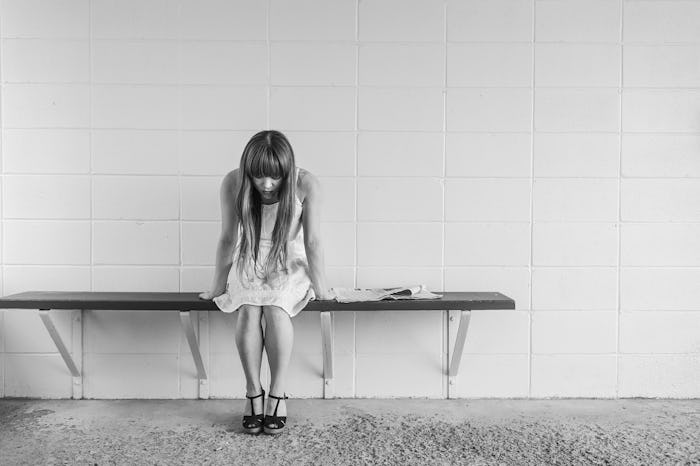As someone who's suffered from anxiety and depression for many years, I have to wonder if things might've been a little bit easier in the long run if I'd been able to read and recognize the signs you might have anxiety earlier on in life. Many of the symptoms of anxiety are often brushed off as insecurity, moody attitude, or simply as silliness by people who don't understand what living with anxiety is truly like. And, as a result, it can be left untreated for years.
Everyone experiences a certain level of anxiety symptoms, from the occasional worry, to being self-conscious about one thing or another, to a bout of stage fright. But people who are diagnosed with anxiety and anxiety disorders face these symptoms on an entirely different level. Often times, when living with an anxiety disorder, the symptoms of anxiety begin to take over your life, preventing you from functioning normally on a day to day basis. Anxiety comes in many different symptoms and forms, and differentiating between normal anxiety and an anxiety disorder can be difficult. If you find yourself suffering from any of the symptoms listed below, you may be living with anxiety and may want to discuss it with your doctor
1You Worry Excessively
A generalized anxiety disorder (GAD) is the broadest type of anxiety and, according to the Anxiety and Depression Association of America (AADA), symptoms of GAD include worrying an excessive amount about every day activities. If you're persistently worried almost every day for a period of six months or longer, or your worry is interfering with your daily life, you may have GAD. "The distinction between an anxiety disorder and just having normal anxiety is whether your emotions are causing a lot of suffering and dysfunction," Sally Winston, co-director of the Anxiety and Stress Disorder Institute of Maryland told Health.
2You Suffer Sleep Problems
According to ADDA, an estimated 54 percent of people with stress and anxiety have increased trouble falling asleep. Though it's fairly normal to experience trouble falling asleep, and sometimes staying asleep, the night before a particularly big life event such as an interview or a big presentation, if you find yourself tossing, turning, and unable to fall asleep on a regular evening, it may be the sign of an anxiety disorder.
3You Have Some Irrational Fears

Though phobias can be crippling, they're not always easy to see on the surface. Often times, people who suffer from specific anxiety disorders, or phobias, find their fears becoming larger than life, and larger than the actual risk involved with the situation. According to HelpGuide, a website dedicated to mental, social, and emotional health, you should seek out help for your phobia if it interferes with your daily routine and causes significant distress.
4Your Muscles Are Tense
Jaw clenching, fist-balling, and other muscle tensions often accompany anxiety disorders. According to the AADA, regular exercise can help keep muscle tension under control, but tension may flare up when your anxiety is aggravated to a certain extent. If your muscle tension is consistent, you may want to seek medical attention.
5You Have Chronic Indigestion
Much like muscle tension, anxiety can manifest itself in another physical manner, chronic indigestion. Irritable bowel syndrome (IBS) is a condition that isn't always related to anxiety, IBS often occurs in tandem with anxiety and make the situation worse, according to WebMD.
6You Suffer From Stage Fright
It's normal for people to experience a bit of nervousness before having to give a speech, presentation, or step into the spotlight in one way or another. But ADDA noted that if your fear is so large that practicing, coaching, or even executing the activity doesn't alleviate your anxiety about it, there may be an underlying problem.
7You're Self Conscious
Though it's common for social anxiety disorders to manifest themselves in events that involve crowds or being in the spotlight, most social anxiety is provoked by simple every day situations. Dr. Thomas A. Richards, Ph.D. and Director of the Social Anxiety Institute described the anxiety associated with excessive self-consciousness as manifesting in situations from walking down the street, to going to the grocery store, to having to introduce yourself to someone new. "In public places, such as work, meetings, or shopping, people with social anxiety feel that everyone is watching and staring at them (even though rationally they know this isn’t true)," Richard wrote. These symptoms can make every day activities very difficult to participate in, and create further anxiety.
8You Have Panic Attacks
Not everyone who experiences a panic attack has an anxiety disorder, but people who experience them repeatedly may suffer from a panic disorder. According to HelpGuide, panic attacks usually consist of fear, helplessness, shortness of breath, pounding heart, numb extremities, sweating, dizziness, chest pain, and feeling an extreme temperature one way or another. Learning to manage your panic attacks is an important part of overcoming the fear of having them, but if you find yourself experiencing panic attacks fairly often, then you should certainly consult a doctor on the best way to manage them.
9You Strive To Be Perfect
Sally Winston, co-director of the Anxiety and Stress Disorder Institute of Maryland, told Health that obsessiveness and a perfectionism often go hand in hand with anxiety disorders. Constantly judging yourself regardless of your outcome, becoming unable to finish a project on time due to constant editing, reworking, and anxiety about the level of excellence involved in the project can all point to an anxiety disorder.
